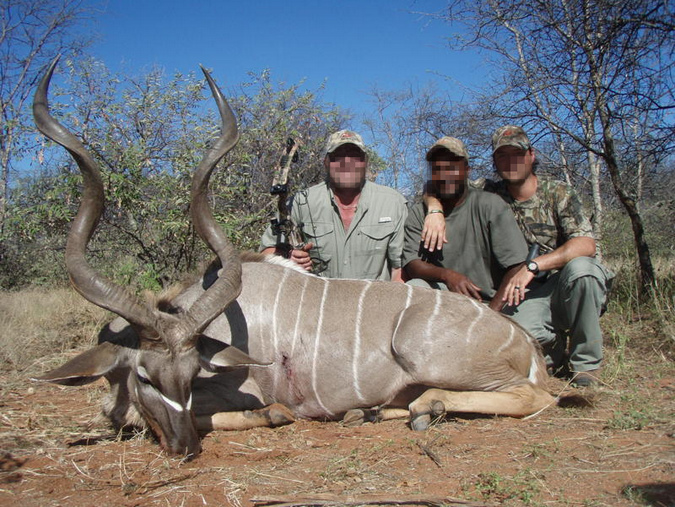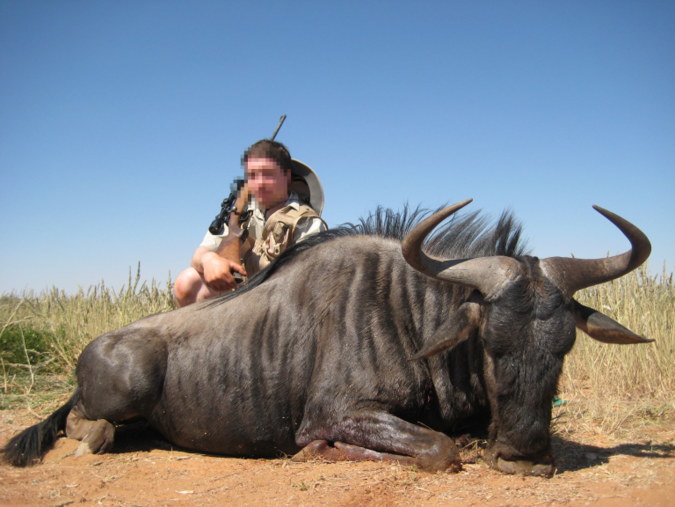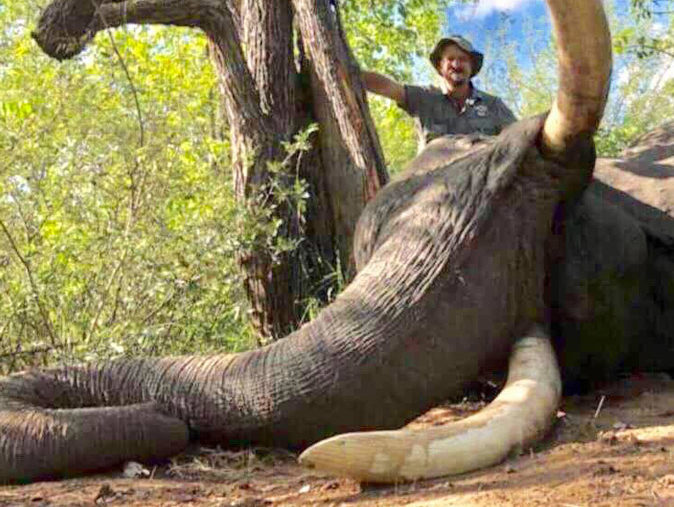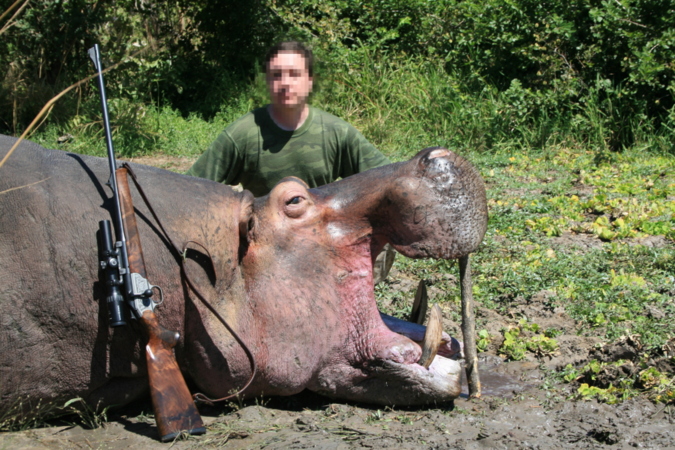
Opinion post by Dr Chris Brown – CEO: Namibian Chamber of Environment
The campaign against trophy hunting – a western urban cultural imposition on rights of rural African communities: arrogant cultural superiority or ignorance?
The difference in views on trophy hunting between the western urban elite and that of the people of rural Africa is stark. In a recent letter to the Guardian, a group of public figures in the UK described trophy hunting as “cruel, immoral, archaic and unjustifiable” and called for an end to global trophy hunting. In much of Africa, rural communities see all forms of sustainable hunting as a legitimate use of their indigenous resources, in much the same way as western nations consider it their right to harvest fish, timber, deer, and use other natural resources for their livelihoods and economic growth. So, what is really behind the call for a ban on the import of wildlife trophies into the UK?
If trophy hunting was in fact good for conservation, would the public figures who are signatories to the letter still oppose trophy hunting? If trophy hunting was good for rural livelihoods in poor African communities, would the public figures still oppose trophy hunting? If trophy hunting had far fewer animal welfare issues associated with it than the widespread factory farming practices of mainly western countries, that puts meat, milk, cheese, eggs on the plates of the members of urban western societies, leather on their feet, and shiny briefcases in their hands, would they still be so opposed to trophy hunting?
And if all the above were true, as well as a range of additional positive benefits such as protection of natural vegetation and landscapes (countering the greatest threat to global biodiversity loss – land transformation), the collateral protection of a suite of less charismatic but equally important wildlife, limiting the impact of climate change, allowing land use to shift from low levels of primary production (e.g. domestic livestock meat production) in the drylands of Africa (covering over 65% of the continent and where most wildlife is to be found) to include wildlife-based service industries to significantly enhance land productivity and reduce climate vulnerability, would the public figures still oppose trophy hunting?

What we are trying to understand is whether these public figures are simply opposed to trophy hunting and perhaps other forms of sustainable use of wildlife because they don’t like the concept of killing an animal of a non-domestic species irrespective of significant potential benefits to conservation, the environment and people’s livelihoods; or do they genuinely think that trophy hunting is bad for conservation, bad for rural communities and violates animal welfare standards? Understanding this is fundamental in addressing the misconceptions of the campaign.
If these public figures are simply opposed to trophy hunting on the grounds of it being uncivilised from the perspective of their own urban western culture, irrespective of any environmental, livelihoods or other benefits, then there is little that can be argued other than to suggest that they should stop trying to impose their cultural views on the rights of others cultures – other cultures where people live side-by-side with their indigenous wildlife on a daily basis. And to tell these public figures that perhaps it is a bit arrogant of them to feel that they can make decisions about how other people, living thousands of miles away, should use their wildlife resources.
And perhaps it is more than a bit arrogant of these public figures, coming from a nation that has lost most of its charismatic megafauna (wolves, bears, elk, lynx, etc.) to impose on people of other cultures, who have not driven their indigenous species to extinction, without consultation or attempting to understand their views, how their natural resources should be used, based on their elitist western urban “civilised” perspectives. Or perhaps it is easier for these public figures to transfer their arm-chair conservation aspirations to a softer and more populist target than address the problems at home – namely to tackle the difficult task of convincing their own farmers and people who use the UK countryside of the importance of re-introducing and re-establishing their own nationally extinct wildlife as free-roaming populations across their own open landscapes.
Because, by trying to close down the trophy hunting sector in Africa, not only are they violating the rights of other people, cultures and nations, but they are removing the economic tools that create incentives for people to be willing to live with wildlife so that Africa’s wildlife does not go the same way as that of the UK – extinct. And these public figures should keep in mind that the challenge of living and farming with wolves, bears and lynx pales into insignificance against that of people living with lions, leopards, hyenas, elephants, hippos, buffalo, crocodiles to mention but a few of the challenging species.

On the other hand, if the public figures genuinely think that trophy hunting is bad for conservation, cruel, immoral, archaic and unjustified, and if they are genuinely interested in doing what is best for the long-term conservation of species, ecosystems and landscapes, and for the welfare of rural communities, then we have a lot to discuss.
Perhaps the first thing to say is that wildlife, and particularly the more charismatic megafauna of Africa, is Africa’s global comparative competitive advantage over the rest of the planet. While virtually every country on Earth has cattle, sheep and goats, only the continent of Africa has the variety and spectacle of wildlife that makes it stand out on the global landscape. How the countries of Africa use their wildlife, in the interests of their people and their economies, is for Africa to decide, not for a group of western urban public figures.
Second, the regions of Africa that have followed a western urban protectionist approach to wildlife management, exemplified by countries such as Kenya, have less wildlife today than at any time in their history. By contrast, regions that have created wildlife management systems based on devolved rights over wildlife to local communities and landowners, together with economic incentives, exemplified by countries such as Namibia and South Africa, have got more wildlife today than at any time in the past 150 years. Kenya’s wildlife continues to decline, Namibia and South Africa’s wildlife continues to grow – including that of elephants, rhinos, lions and other species.
Third, trophy hunting is an important component of the wildlife economy. It cannot be substituted by ecotourism. In many areas, ecotourism has little potential, but the land is kept under wildlife and natural vegetation by the economic returns from trophy hunting, wildlife harvesting (for venison) and the live sale of surplus high-value wildlife. In some areas, all four forms of wildlife management are practised on the same land, i.e. tourism, trophy hunting, harvesting for meat and live sale. The greater the returns that can be sustainably generated from wildlife, the more secure is that land from agriculture, land transformation and a permanent loss of biodiversity.
Wildlife populations typically have natural rates of increase of between 15-35% per year (large species such as elephants and rhinos breed more slowly). Namibia’s wildlife population, for example, numbers about 3 million animals. Of these, only about 6% are in national parks which cover some 17% of the country. This apparent disparity is because a large component of Namibia’s national parks network is in the hyper-arid zone of the Namib Desert with very low rainfall (less than 70 mm per year) and low wildlife carrying capacity. Thus over 90% of Namibia’s wildlife is on communal and freehold farm land – and it is there only because it has value and people want it.
As a result, an additional 34% of Namibia outside of the national parks network is under formal wildlife management. Wildlife populations in these areas need to be managed to ensure that the natural vegetation is not damaged by overgrazing and over-browsing. Trophy hunting removes less than 1% of the national wildlife herd per year. These are mostly old bulls passed their reproductive peak. Harvesting for meat takes off most of the surplus animals. Because trophy hunting is such an important component of wildlife conservation and the wildlife economy, it is preferable to refer to it as “conservation hunting”, as the benefits include increasing land coming out of traditional agriculture and under indigenous biodiversity management. In Namibia, conservation hunting contributes about 20% more to the national economy than the entire small-stock farming sector, (about 4 million sheep and goats on about 27 million ha of land), with conservation hunting taking off less than 1% of the national wildlife herd per year. Much of this income flows to rural communities, as does the meat from animals hunted in their areas.
Fourth, it is necessary to clearly differentiate between legal hunting and poaching. Not to do so is akin to lumping legal diamond sales with illicit diamond dealing, legitimate cattle production with cattle rustling and the legal pharmaceutical industry with the illegal drugs trade. We don’t close down the legal components of these enterprises because there are illegal elements at play. And if anyone thinks that, by closing the legal pharmaceutical industry, the illegal drugs trade would be diminished or eliminated, they are delusional – the illegal drugs trade would simply expand to address the demand. The same applies to hunting, poaching and the illegal wildlife trade. Legal hunting is based on quotas and regulated activities with benefits going to those who manage the resource and run the businesses, and taxes going to the state. Poaching is theft, often incentivised and driven by international criminal syndicates – most from Asia.

Fifth, much of the hunting and sustainable utilisation debate within conservation has been taken over by the animal rights movement. We have great respect for people who stand up for animal welfare – we all should. The way that domestic animals are mistreated in high-intensity production systems, turned into factory units, held in unbearable conditions, will go down in history as one of Homo sapiens’ greatest crimes.
But animal rights and animal welfare are two very different things. The situation of wildlife in its natural habitat, in large open systems, is profoundly different to the life that domestic animals in factory conditions, abused by chemicals and a total lack of consideration for their species-specific requirements and welfare, face each and every day – particularly in the industrialised world where such practices are most prevalent. Animal welfare of domestic animals in high-intensity production systems should be by far the most pressing animal welfare issue on everyone’s agenda. From a conservation biology perspective, problems arise when animal rights agendas are passed off as conservation agendas, which they are not.
Conservation works at the population, species and ecosystem levels. Animal rights works at the individual level. And what might be good for an individual or a collection of individuals might not be good for the long-term survival of populations, species and ecosystems. This of course does not negate the need for ethical and humane practices, which should always be an integral part of good conservation management and science.
And finally, the economic drivers around wildlife conservation in the drylands of Africa are quite different to those in most western countries. The value of wildlife in western countries is generally far lower than that of Africa. This, combined with the fact that the agricultural potential and access to lucrative markets are far higher in western countries means that market forces are working against indigenous wildlife and in favour of agriculture and land transformation. The response of western conservation organisations and individuals is thus to counter these market forces, try to prevent the commercialisation of wildlife (because the land and its biodiversity will be lost to conservation anyway) and resist consumptive use of wildlife.
However, the system is quite the opposite in the drylands of Africa, provided rights over wildlife are devolved to local communities and landowners. Then, wildlife as a land use outcompetes agriculture and its associated land transformation. And the more it outperforms agriculture the more secure is the land and is biodiversity for long-term conservation. Removing conservation hunting from the wildlife economy reduces its competitive edge to the point where large areas will simply revert to agriculture.
For those living in western economies, the situation of conservation hunting in the drylands of Africa may seem counter-intuitive. But for us in Africa, it is so obvious that we wonder why seemingly intelligent and well-meaning western conservationists are continually trying to undermine our conservation work, particularly where the record of conservation accomplishment in African countries with devolved economically-based sustainable use policies is so obvious.
Dr Chris Brown is the CEO of the Namibian Chamber of Environment (NCE), an umbrella membership body for environmental NGOs in Namibia. The NCE currently has a membership of 64 environmental NGOs – well over 90% of all ENGOs in the country. Dr Chris Brown is not a hunter. He is a vegetarian since the age of 11 because of welfare issues around domestic animals, a former director of the Namibia Nature Foundation (for 12 years) and the first Director of the Directorate of Environmental Affairs in the Namibian Ministry of Environment & Tourism. He has a PhD in conservation biology and interests in the tourism industry in Namibia.
To comment on this story: Login (or sign up) to our app here - it's a troll-free safe place 🙂.![]()






